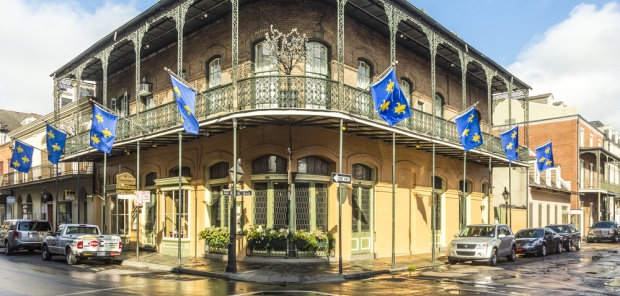
New Orleans Public Safety Investments Announced
The 2017 investments unveiled Jan. 23 include more than 200 new high-definition security cameras and signage in 20 hotspots, more than 100 new license plate readers deployed citywide, and a 24/7 command center from which the cameras, license plate readers, and other technology will be monitored.
New Orleans Mayor Mitch Landrieu and Louisiana Gov.John Bel Edwards, joined by NOPD Superintendent Michael Harrison, Louisiana State Police Superintendent Col. Mike Edmondson, and FBI Agent in Charge Jeff Sallet, this week introduced a package of almost $40 million in public safety and homeland security investments to fight crime. Included are new police cars for added visibility and new alcohol beverage outlet regulations to increase security in hot spots throughout the city and harden critical assets that are vulnerable to terrorist-like incidents.
The city is a tourist and convention mecca, with this year's conventions including Safety+, the annual National VPPPA Safety & Health Conference. It's taking place Aug. 29 to Sept. 1, 2017, at the Ernest N. Morial Convention Center in downtown New Orleans.
"Public safety continues to be our top priority," Landrieu said Jan. 23. "The best way to continue to fight crime is to improve manpower, crime deterrence, and our apprehensions with investments in technology and visibility. In the wake of attacks in Nice, Berlin, and Israel, we also have to ensure we bolster our homeland security preparedness. With the help of Governor Edwards, the Convention Center, City Council, legislators, and other stakeholders, we are confident this package will increase security for New Orleans residents, workers, and visitors."
"New Orleans is not only a great place to live and work, but a major tourist destination, and we must do all that we can to provide first-rate protection for the enjoyment of everyone," Edwards said. "This partnership between the city and state is critically important. This isn't just about the French Quarter; this is about the entire city of New Orleans, and I am grateful for the hard work put into this effort by the mayor, as well as state and city officials."
"All of these efforts are part of our ongoing commitment to make our neighborhoods safer. Under this new plan, we are expanding the resources to our officers and bolstering our preparedness. I am confident that this package will help strengthen the tactical efforts of the New Orleans police department and our partners," Harrison added.
Melvin Rodrigue, president of the Morial Convention Center, said, "We are working on infrastructure investment in and around the areas in which our guests visit and our employees live. When reflecting on where we are and the transformative things we want to do in the future, we realize we need to make sure our guests and employees are safe today to get to where we need to be tomorrow. The city's partnership is imperative to the success of this comprehensive program."
The 2017 investments build on a 60 percent reduction in police response times to emergency calls and a double-digit reduction in armed robberies in 2016, plus a 2016 University of New Orleans survey that found residents' satisfaction with NOPD rose from 33 percent in 2009 to 64 percent in 2016, according to the city.
The city has increased NOPD's budget to $150 million for 2017, which includes $11 million for overtime, new license plate readers, and more than 20 new civilian positions. The 2017 investments unveiled Jan. 23 include:
- More than 200 new high-definition, public security cameras and signage in 20 hotspots
- More than 100 new license plate readers deployed citywide
- A 24/7 command center from which the cameras, license plate readers, and other technology will be monitored
- 300 new police take-home cars to improve visibility for NOPD patrol officers who live in Orleans Parish
- Adding K9 units with gun- and bomb-sniffing potential to deter illegal possession of firearm detection and terrorist activity
- Remote sensing technology on Bourbon Street to assist officers in illegal possession of a firearm detection
- Hardening street infrastructure and pedestrianizing Bourbon Street with bollards during certain times to prevent a Nice- or Berlin-style attack
- Brighter LED lighting in the French Quarter that had previously only been used citywide
The mayor also committed to working with the City Council on new alcoholic beverage outlets regulations that require outward-facing security cameras that can be tied into a 24/7 command center for monitoring and a law to mandate that outlets ensure their doors are closed at 3 a.m.